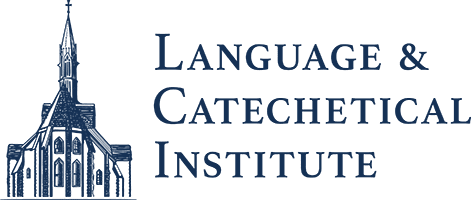By Gracie, who spent three weeks in Kazakhstan with a team of CMC missionaries.
It all started with flying into Atyrau. Atyrau is a city in western Kazakhstan that is split by a river. When you are on one side of it, you are in Europe. When you cross to the other side, you are in Asia. Atyrau is quite hot during the summer, which means that the daily schedules are sort of shifted. Everyone’s day started later in the day. Though there were many children who would come out and play, they wouldn’t come out until mid-afternoon. The nightlife therefore, was amazing. Everyone, including families with small children, would be out walking in parks or fairgrounds at ten at night, as if it were the middle of the day. This was all very practical for avoiding the heat, but also made nightlife lively, fun, and magical.
While we were in Atyrau we stayed in the local parish house. This was the only Catholic church in Atyrau. Father Marian and Father Peter were the two priests at this parish while we were there, and they were as kind as could be. (Side Note: In Kazakhstan, there is no state religion, but by law no one is allowed to practice their religion outside of church property. Even praying in public, no matter what religion you are, is technically illegal). At the church we stayed in, children from all over came to play and hang out. Kids of all ages and parents, too, come for the community and fun. The church’s gates are open and everyone is welcome to come in.
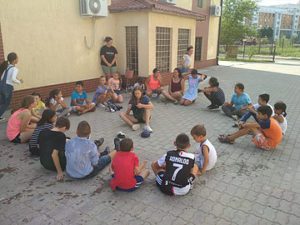
Water games are always popular with kids, especially in the dry heat in Kazakhstan
During our week in Atyrau, we organized and led an English camp for kids ages 6 to 14 years old. Only a couple of kids could speak or even understand English. While we had translators for a few of the days, we often did not, but we still managed to somehow make it work in the end. The camp consisted of games, dancing, English lessons, and snack time. The kids were always high energy, and while a bit competitive, they were mostly in it for the fun.
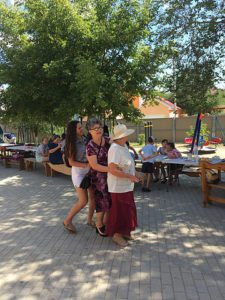
At the shashlik. These Russian women started to dance and motioned for me to join them. How could I refuse?
The parish community was also wonderful to us, and was such a joy to experience. After Masses we were able to introduce ourselves and give testimonies. During our stay there the church in Atyrau celebrated the feast of the Transfiguration (the feast that the parish was named after), and so we experienced our first “shashlik.” This is basically a cookout where they grill meat on sticks which is very yummy. The whole community came together to prepare the food, cook it, and eat the delicious feast. There was little to no verbal communication between us due to our lack of Russian, but they made us feel right at home.
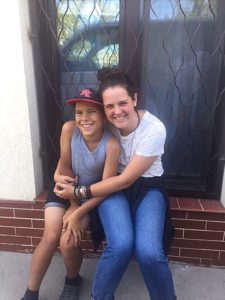
Myself with Pasha. He became my special friend while I was in Atyrau. He loves soccer, chocolate, and being very much involved in whatever is happening. While some kids don’t interact with us right away since it is difficult to communicate, on our first meeting, Pasha was kind enough to teach me the Russian words for the food we were eating. He always seemed to be filled with joy though his life was tough, and his smile was one of the most beautiful I have ever seen. It was more than hard to say goodbye to this little guy.
Our next stop was beautiful Ozernoe. It took us four days of driving to arrive there. Ozernoe is a Marian pilgrimage site in Kazakhstan, and once a year all the Catholic youth (and some who are not Catholic) come to Ozernoe to experience community, spiritual growth, friendship, and to honor the Blessed Mother.
We started with two white vans full of priests, religious sisters, and Kazak young adults, and over the course of the next four days drove almost 2,000 kilometers, picking up more and more people and vans as we went.
Kazakhstan is very flat. and nothing brings this to your attention more than driving for four days. Trees were an exciting sight and the occasional hill, if you could even call it that, was rare. What we were driving through is called the “steppe” (large areas of flat grassland in south-eastern Europe or Siberia). At first, steppe appeared to be pretty boring. I was fine with that. I didn’t even really think about it. I mean, not everywhere can be the most beautiful in the world. But within a very short time, the steppe became one of the most beautiful places. You could see for miles and the sky was the biggest I have ever witnessed. The sky was never boring: the clouds, sun, colors, and weather always made it a gorgeous sight to behold. The amount of space around you makes you feel like there are limitless possibilities, and the wild horses and camels makes you feel wild and free.
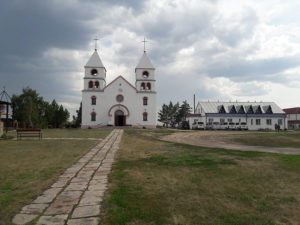
The church in Ozernoe. Just beyond the building to the right is where we stayed for a week.
Ozernoe is an extremely tiny village in literally the middle of nowhere. The reason that there is a village at all, is because the Soviets had deported many Eastern Europeans to this place and left them with nothing, in a wasteland basically. They had no shelter or food and were in the middle of Siberia. They ended up making shelters out of mud and grass, but food was still a problem and there was nothing they could do. Many starved and froze to death. Their faith was strong, though, and they would pray the Rosary in secret, asking for help from the Blessed Mother. When winter came, the snow melted and a lake was formed. Not only that, but there were fish in the lake. And not just some fish, but an extraordinary amount of fish. This was the miracle of Ozernoe and from Our Lady who is known as Our Lady of the Plentiful Catch.
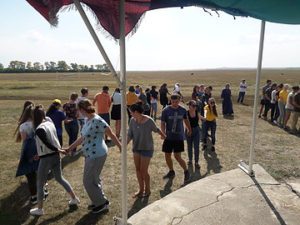
We have done a lot of dancing throughout this summer, but Ozernoe is where we did the most group dances. The fun was never ending, especially when no one had any idea what they were doing.
This is the super summarized version of the miracle that took place here, but the amazing thing is that it was not a one-time occurrence. The lake continues to disappear and reappear. It also continues to have the miracle of the abundance of fish. (The most recent time happening in 2017 – the anniversary of Our Lady of Fatima). Pope Saint John Paul II on his visit to Kazakhstan called Ozernoe a “national shrine” of Kazakhstan, and I feel like I cannot make a big enough deal about it.
We really had no idea what to expect from Ozernoe, but it is difficult to explain what we experienced. It was such a strong spiritual experience. While we stayed in Ozernoe, we prayed, danced, played sports, sang, ate, and cleaned all together. It was such a peaceful place and there was a strong emphasis on listening. I won’t say that it was easy to feel spiritually fulfilled there. Sometimes I felt nothing, but the days were rich with spiritual prayer life and activities that made for a growing experience.
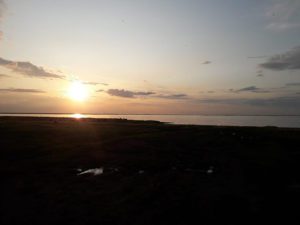
The miracle lake of Ozernoe. It wasn’t there just a few years ago.
On another note: Does the word “flies” mean anything to you? We actually stayed in a room full of about 15 young women and about one million flies, and we had the best conditions. For example, we had an indoor bathroom. And the fact that we had a shower available to us, was the envy of many of the men staying in other buildings. Biting flies and mosquitoes were also sometimes an issue, but none of these things seemed to matter. None of these things made us want to leave any sooner.

All the people who came to Ozernoe went on a prayer procession.
We also experienced new types of food. (Side note: Later on in Kazakhstan we ended up trying traditional Kazak food, which included horse meat! I must say it was quite good. It was in a sausage form and I would definitely eat it again. But this was not in Ozernoe). In Ozernoe we drank hot tea at every meal, which makes you not need tea in your life for a while after that. We also experienced noodles in hot milk for the first time, and I think I don’t need to experience that again. But there was also some great and hearty soups that were made, and fried donut-type things that were filled with potatoes and cabbage were amazing.
It is very interesting to me because while in Ozernoe, we were probably able to communicate the least with people than any other place this summer. The bond we developed though, was quite possibly the strongest for the few short days we were together. People we had smiled at in passing were giving us, and we them, heartfelt and translated goodbyes. Why had we not gotten translators to translate entire conversations with each other during the week? We could have, but it seems that our witness to each other without understanding words had been more meaningful, and in the end, we needed that expressed to each other before we went our separate ways in life.
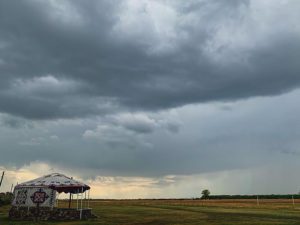
I just love this picture. It shows a glimpse of the beauty of the steppe (though there are trees in this instance) and the beautiful big sky of Kazakhstan, and it gives a nod to the Kazak heritage of the yurt.
After Ozernoe we drove for two days and then stayed in a parish house in Khromtau. There we lead a retreat for teenagers and young adults of the area. This was also a very positive experience and we were sorry that we couldn’t stay longer and work with the youth more. Here is a side note about the faith in Kazakhstan: The Faith in Kazakhstan is very young. This makes the Church there made up of, yes the elderly, but also, percentage-wise, largely the youth. While in the West there is such a long history of the faith and tradition, in Kazakhstan, there is none of this. Pope Francis reminds us that the youth are not the Church of the future, but the Church of now. Kazakhstan is the perfect manifestation of this.
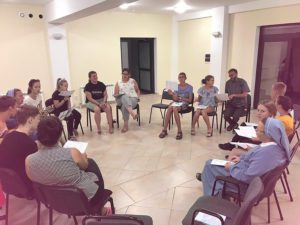
Singing praise and worship songs in English and in Russian as part of the retreat we put on for the youth and young adults in Khromtau.
Our last stop in Kazakhstan was Astana. (This is the capital of Kazakhstan – within the last year the name has been changed to Ner-Sultan, but it is still referenced as Astana). We went there for our departure flight, but we thought we could also be of service in some way while there. We thought maybe offering some help to the Missionaries of Charity in the area. We were in for a surprise though, when Father Mihai became our personal tour guide and most hospitable host. He took care of us all day and was full of information and joyful stories all day long. We were able to visit the Missionaries of Charity for morning Mass and breakfast, but they didn’t allow us to help them since it was a celebration of their feast day, and they said we were their guests.
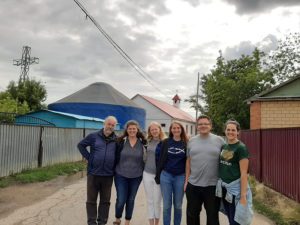
Our time in Astana though short will always be remembered as joy-filled thanks especially to Father Mihai (on the far left) and his abundant generousity and hospitality, but also to Lera and Father Pawel.
Ok, so I know that was long, but I feel obligated to really try and explain what this time in Kazakhstan consisted of. What I learned from this entire experience was humility, humility, and some more humility. I saw humility in the simplicity of Pasha, the little boy who befriended me in Atyrau. I think “simple” is the best word to describe him and it was beautiful to witness the love he could show through his simplicity. In Ozernoe the theme of listening was very humbling, when you stop telling and asking God for things, but sit and listen. In Khromtau and Astana the humility was manifested through the deep, generous, genuine, and joyful hospitality that was given to us.
I miss Kazakhstan greatly and I pray that more people learn about and experience the richness of the country and the Faith there.
